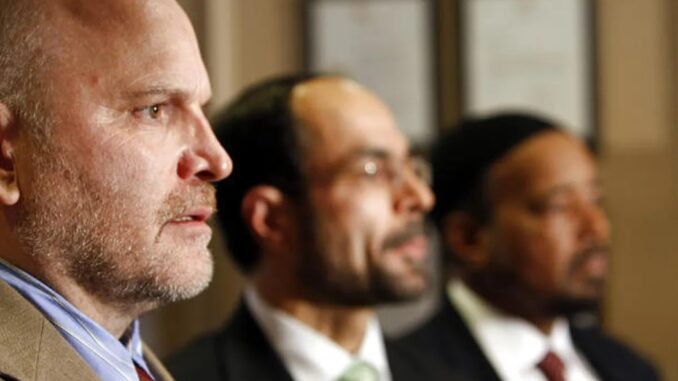
إن الله لا يهدي القوم الظالمين
“Allah does not guide abusers to righteousness”
Ramadan began with a bombshell: NPR ran a deep investigation by journalist Leila Fadel into sexual abuse, misogyny, and corruption at CAIR.
The NPR story is groundbreaking. It picked up on some of the online buzz about the leader of CAIR-Florida Hassan Shibley allegedly abusing his wife and engaging in serial bigamy and abuse. But it also went beyond Shibley’s sketchy conduct to reveal a pattern of misogyny throughout CAIR as an organization. I was amazed that NPR picked up the story, and Leila Fadel deserves credit for doing a fair investigation. Problems we have discussed on this blog for years have now gone mainstream.
That NPR ran the story during Ramadan was poetic – a moral indictment of the rot inside CAIR, where our community’s own self-proclaimed leaders abuse their power to take advantage of vulnerable women.
Ramadan is when we cleanse ourselves from sin by fasting and striving to pursue good. We are now in the last ten days of the month, which include Laylat al qadr when our sins are purged. I’m not the type who does i3tikaf, but I use the tarawih time to re-read the Quran. This year, the quote above from Surat Al Maida jumped out at me.
CAIR’s leaders could have taken the NPR expose and the month of Ramadan to come clean. Nihad Awad could take responsibility for the organization’s misdeeds and begin working to repair the damage. Ramadan after all is the perfect time for accountability and healing.
Instead, Nihad Awad and Ibrahim Hooper remained publicly silent in reaction to the story, hoping the scandal would quickly dissipate. Their PR crisis management strategy was, shockingly, trying to hide behind women. Rather than show any concern for the many women cited in the article who endured abuse, they displayed remarkable cynicism.
The same day NPR’s story ran, Awad and Hooper put up on CAIR’s website a long glowing profile of a female CAIR board member, describing her as fearless and empowered. The message: We can’t possibly abuse women, why look at our board member!
Then several prominent female CAIR staffers began deploying a truly creepy defensive argument. Zahra Billoo from CAIR California took to social media to claim it was “irresponsible” and “insufficient” for NPR to publish Leila Fadel’s story. Her implication: any problems should only be discussed behind closed doors – i.e swept under the rug.


I wonder how Awad, Hooper, Biloo, and other CAIR leaders are processing Ramadan this year. Are they coming before God with a pure heart and owning up to the abuses that have happened under their watch? Are they standing during tarawih and at least to acknowledging to themselves that they have caused many women – and our community as a whole – enormous damage? Sadly I doubt it.
But let’s be blunt: lying, cheating and oppressing are the exact opposite of Muslim values.
I am doing my best to purge and purify myself, taking advantage of this once a year opportunity to contemplate my own shortcomings. I don’t enjoy complaining about other people’s failures, but I feel a responsibility not to be silent while people are being abused. CAIR’s leadership is immoral and deeply harmful to all of us.
Come next Ramadan may the rot inside CAIR finally be cleansed away. Amen.
[There is so much more to say on this story. Stay tuned.]
